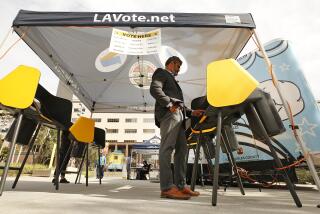Fair Political Practices Panel Accuses Getty Heiress of ‘Campaign Money Laundering’
- Share via
SACRAMENTO — California’s Fair Political Practices Commission has sued Caroline Getty, heiress to an oil fortune, charging Thursday that she failed to publicly disclose that she was the source of $1 million in campaign contributions to statewide park bond measures in 2000 and 2002.
The suit accuses Getty, the granddaughter of J. Paul Getty and a philanthropist who supports an array of environmental causes, of “campaign money laundering” in giving the donations to the Nature Conservancy.
The Conservancy used the money to support campaigns for the bond measures.
Getty did not contribute to the Nature Conservancy under her own name. Instead, she obscured the source of the donations by giving the money through Wild Rose LLC, a limited liability corporation that she controls. At the time of the donations, Wild Rose’s address was listed as a post office box in Seattle, and its officers had not been publicly disclosed.
Fines stemming from the civil suit could amount to $520,000, according to the commission. Commission spokeswoman Sigrid Bathen said the agency takes allegations of money laundering especially seriously.
Campaign finance reform advocates believe that voters can make more informed decisions if they know the sources of money being used to finance the campaigns.
“I honestly believe that, if you want to contribute, you have to let people know who you are,” said Jon Coupal, president of the Howard Jarvis Taxpayers Assn. “That is a cost of doing business.”
Coupal’s group opposed the 2002 park bond. He recalled having wondered about the source of the Wild Rose money, in part because, in some instances, supporters of the bond measures may benefit when proceeds from the bonds are used to buy their property.
Sydney Kapchan, spokeswoman for the Nature Conservancy, said none of the park bond money had been used to buy any property belonging to Getty, and the commission has not suggested otherwise.
In a statement, the Nature Conservancy said that it had “fully complied” with campaign finance laws, but it declined to comment in any detail on the case.
Getty’s attorneys did not respond to a request for comment.
Getty gave her first $500,000 donation to support Proposition 12, a $2.1-billion bond measure to buy parkland that had been approved by voters in 2000. When opponents of the measure protested that the source of the donation was unclear, Getty issued a public statement acknowledging that she had given the money.
But the commission alleged that Getty used a similar technique again last year, using Wild Rose to give $500,000 to the Nature Conservancy, which used the money to help win passage of Proposition 40, a $2.6-billion bond to buy more parkland.
“It is disturbing that the pattern was repeated in 2002,” said Jim Knox, director of California Common Cause, among the advocates of open campaign disclosure. Knox also said the Nature Conservancy “had an obligation” to properly report the donation and inform Getty of her obligations.
“The burden here lies on the Nature Conservancy both to report the donation and to disclose to their donor that she has an obligation to report,” Knox said.
More to Read
Get the L.A. Times Politics newsletter
Deeply reported insights into legislation, politics and policy from Sacramento, Washington and beyond. In your inbox twice per week.
You may occasionally receive promotional content from the Los Angeles Times.










